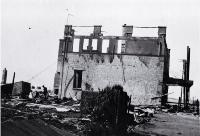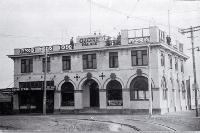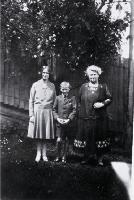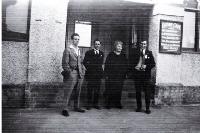![]()
Isabella Lavery, daughter of booksellers Ellen Bassett and her husband, Robert Lavery, was born at Warnambool, Victoria, in 1866. At 23 she married Harry Hucks and about 1903 husband, wife, four daughters and one son came to Christchurch.
About 1909 a businesswoman, Mrs Schneider, opened the Theatre Royal Cafe, and hired Isabella as her chef. She soon became sole proprietor. In a life of almost 50 years the establishment was to have three changes of address within 50 yards in Gloucester Stree, one of these within a second Hucks building, Hall's Bellvue Hotel. The final location had a large roomy frontage and a bold sign, 'Mrs Hucks' Theatre Royal Cafe'. Isabella's domain, a grillroom where eggs, pies and steaks were consumed, was a men-only institution. It was particularly busy after Saturday sport, and had a faithful clientele. 'The boys' came to know Isabella as 'Mother Hucks', 'for her personal interest in them was much in the nature of a mother's'. But just as mothers have to correct recalcitrant children, so too did Isabella on occasion have to discipline unruly 'boys', and, if a warning did not work, eject them.
In 1914 Isabella took out a mortgage with the Sydenham Money Club and built two substantial structures at North New Brighton. The Ozone Dressing Sheds faced Marine Parade. The two-storey Ozone Cafe, 'a well-appointed brick private hotel', on the northern corner of Marine Parade and Bowhill Road was a palace amid the bleak sand dunes and mean holiday baches which were features of the area.
On an April evening in 1922 a crowd sat on sandhills in Rawhiti Domain and watched a spectacular blaze gut the Ozone complex. The Hucks family had a narrow escape, Isabella leaving the cafe in her night attire. Despite incurring a heavy financial loss, the doughty Australian was soon restoring the dressing sheds and cafe to their former glory.
At a time when public changing facilities were non-existent but bureaucracy demanded that flesh be concealed within neck-to-knee bathing costumes, the Ozone Dressing Sheds supplied the seaside visitor with changing cubicles, the prescribed beach dress, towels and afternoon tea. At the cafe, Fendalton folk could enjoy an upmarket atmosphere. The rooms were panelled and illuminated by beautiful leadlights, and the dining room floor, built of narrow boards, provided an ideal surface for dancing. A collection of flags was hung around the walls, the tablecloths were snow-white linen, and - a Hucks trademark - everything was scrupulously clean. Both the plebs at the dressing sheds and the gentry at the cafe consumed food from high class crockery embossed with the word 'Ozone'.
Locals employed to cater for the large numbers who sat down to a summertime Sunday dinner at the cafe found the stout, jolly Isabella an excellent employer. However, 'Mother Hucks' preferred to use her family's labour. Harry had a contract to remove clinker from the Christchurch gasworks, and worked at the Lake Coleridge power station, but often he was to be found at the back of the cafe managing a beehive and a fowl and duck run. These provided the guests with honey, eggs and meat. Sometimes at Gloucester Street Isabella became exhausted at the behaviour of 'boys' firing butter and pie at the ceiling or at each other. "I'll get Mr 'Ucks, I'll get Mr 'Ucks", she threatened, but Harry, less robust that his wife, inspired little fear in the riotous youths. The daughters cooked, cleaned and waitressed for their mother even when married, and the husband of one daughter, a taxi-driver, brought overseas visitors to his mother-in-law's establishments.
The Ozone complex was not a financial success. The Sydenham Money Club, as mortgagee, muttered darkly as it came to realise that service, flair and the Hucks name were insufficient to bring profitability to an enterprise in a depressed part of Christchurch, which was visited by the big spenders only in the summer months. When Harry died in 1926, Isabella disposed of her seaside interests and once more devoted her full attention to the Theatre Royal Cafe.
'Mother Hucks' never changed her style. At the end of World War I she had loaned the Ozone Cafe to the Veterans' Association for a year, paid the wages of a caretaker and his wife, and seen the establishment of the first invalid soldiers' home. Now, with the onset of the Depression, her generosity was once more apparent. Every day billies of soup were sent to Nurse Maude in Madras Street. Isabella scrutinised the needs of 'the boys' and was 'the first to come to the assistance of anyone who happened to be down on his luck'. The family still supplied labour.
Early each weekday a grandson would take the butcher a message about how his grandmother would like her customers' steak cut. He would then come to the cafe with the meat and place it in an ice-chest. After school he and a cousin would reluctantly forego sport and wash and dry dishes all for the price of a kiss and an apple. The old lady lived a spartan existence, working long hours and sleeping in the cafe storeroom on a stretcher. Underneath she kept her coffin. Eventually cancer struck. Her obituary commented: "In the last stages of her illness, when she had been long away from business, she frequently inquired after particular habitues of her restaurant who were less customers than friends, and nothing delighted her more than a personal message sent to her by one of her daughters from any of 'the boys'". Isabella died peacefully, at 69, on 16 June 1936.
Sources
- Births, deaths and marriages, Christchurch
- Brighton breezes: Articles in Saturday Star, 1914-30
- Isabella Hucks' will, Archives New Zealand, Christchurch
- McLauchlan, Peter, 'Canterbury sketchbook', Press, 3 and 31 July 1993
- McLauchlan, Peter, Papers, Christchurch City Libraries
- New Brighton publicity committee, New Brighton, New Zealand: Canterbury's playground, 1923
- Press, 28 March 1923 & 17 June 1936
- Star, 16 June 1936
- Richard Greenaway: Interviews in 1974-77 with J S Freeborn, Lindsay Hawkins, David Russell, Max Whatman, Clara Freeman, and Mrs Manson of North New Brighton; and, in September 1993, with Mrs Hucks' grandsons, R H Davison and Winston Frame.
Other resources - Christchurch City Libraries
- Catalogue search on Isabella Hucks
- Catalogue search on Ozone Cafe


 Discover your family’s history at our libraries
Discover your family’s history at our libraries



